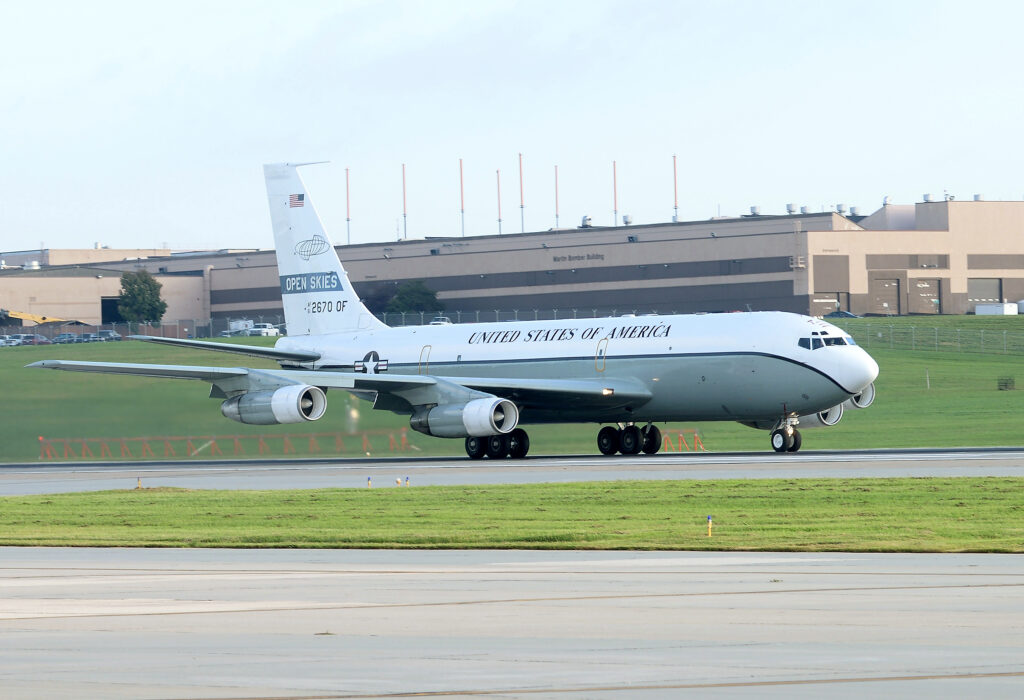
An OC-135 Open Skies aircraft takes off in 2018 from the flight line at Offutt Air Force Base, Nebraska.
WASHINGTON: The US will formally withdraw from the 18 year-old Open Skies Treaty in protest of continued Russian violations, Secretary of State Mike Pompeo announced today, marking another international pact the Trump administration has concluded no longer suits American interests.
The 34-nation treaty grants each state the right to carry out reconnaissance flights over one another’s territory to collect information about military activities and enforce arms control agreements.
The primary reason behind the US abandoning the treat is Russian perfidy, Pompeo made clear. “It has become abundantly clear that it is no longer in America’s interest to remain a party to the Treaty on Open Skies,” as Russia’s refusal to comply with the treaty’s conditions “has, in fact, fueled distrust and threats to our national security – making continued U.S. participation untenable.”
The Trump administration has long argued that Russia is violating the treaty. last year, it kicked off an internal review last year to weigh whether or not to remain a party to the treaty. Prominent hawks within the White House, including then-National Security Advisor John Bolton, have expressed their distrust of older arms control agreements which they argue places the United States at a disadvantage while countries like Russia regularly cheat.
In March, Defense Secretary Mark Esper told the Senate Armed Services Committee that Russia had long subverted the pact, preventing the US from flying over the heavily-armed exclave of Kaliningrad, the southern border with Georgia, and Chechnya, adding, “they have been cheating for many years.”
Jeffrey Edmonds, former director for Russia on the Obama administration’s National Security Council, told me Russia has long played loose with the treaty, with Moscow using “clauses in the treaty where you can curtail certain flights…to make an argument that we couldn’t do certain things at certain times.”
The Obama and Bush administrations pushed back on those Russian moves to little avail. Edmonds, currently with the Center for Naval Analyses, said Russia benefits more from the treaty than the United States since American space surveillance assets are more advanced than Russia’s. But that’s not the full picture.
“But when you do a net assessment of the treaty, when you consider the fact that our allies use it a lot and it’s not really costing us much,” he questions the unilateral American withdrawal. “It’s not like the INF Treaty, where we were staying in a treaty that was dangerous to us and limiting us while Russia was driving ahead. Even though I do think the Russians were not fully complying, you need to look at the broader picture encompassing allies, arms control, and strategic stability — I think its net benefits outweigh its costs.”
The announcement unleashed a rash of criticism from current and former government officials accusing the administration of ignoring the law.
Sen. Jeanne Shaheen, member Senate Armed Services and Foreign Relations Committees, said in a statement, “President Trump is barreling down a path that ultimately makes us less secure and cedes U.S. global leadership,” at a time when many allies are concerned the administration will refuse to negotiate an extension of the New START treaty which expires in January. “It betrays the transatlantic alliance,” Shaheen added, since it’s “part of an overlapping arms control framework that has helped maintain and promote global stability for thirty years.”
Greg Delawie, former deputy assistant secretary of state for arms control who oversaw Open Skies from 2012 to 2015, said in a statement US withdrawal “would be a gift to Russia and a slam at the NATO Alliance which depends on it. It would also represent another unfortunate chink in the armor of arms control agreements that have kept America and its allies safer since the Cold War.”
Representatives Adam Smith, chair of the House Armed Services Committee, and Jim Cooper, chair of the House Armed Services subcommittee on strategic forces, call the decision “a slap in the face to our allies in Europe, leaves our deployed forces in the region at risk, and is in blatant violation of the law.”
The Trump administration failed to notify Congress of its intent to withdraw within the 120-day notification window as required in law, the 2020 National Defense Authorization Act.
Rep. Eliot Engel, chair of the House Committee on Foreign Affairs also admonished the Trump administration for ignoring the law stipulating Congress be consulted.
The administration “has had many months and ample opportunity to follow the law by consulting with Congress and our allies but, unsurprisingly, President Trump and his appointees have again shown their disdain for arms control, lack of respect for Congress and its Constitutional authority, and disregard for the rule of law,” Engel said. “There is something particularly dangerous about a President, a Secretary of State, and a Secretary of Defense knowingly breaking the law in ways that jeopardize our safety and national security.”
The list of American complaints, he said, include Russia’s “limiting flight distances over Kaliningrad to 500 kilometers, which reduces transparency and a heavily militarized area,” as well as denying a flight over major military exercises past year “which completely prevented imaging of military exercise activity that was scheduled and approved previously.”
The treaty was first suggested by President Dwight Eisenhower in 1955, but it was rejected by the then-Soviet Union. President George H.W. Bush came back to the idea in 1989, and it became reality in January 2002. Since then, more than 1,500 flights have been conducted by the 34 signatories.
In a ‘world first,’ DARPA project demonstrates AI dogfighting in real jet
“The potential for machine learning in aviation, whether military or civil, is enormous,” said Air Force Col. James Valpiani. “And these fundamental questions of how do we do it, how do we do it safely, how do we train them, are the questions that we are trying to get after.”


























